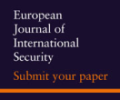Blog by John Owen
European Journal of International Security, inaugural issue. View full article here.
The ‘Arab Spring’ is a conceptual blob – or, at best, a tangle of events across thousands of kilometers and scores of days, events whose connections are not clear. We do not have a good account of how the self-immolation of Mohamed Bouazizi, a street vendor in a small Tunisian city, produced the NATO intervention in Libya, the election of a Muslim Brotherhood government in Egypt, and the Syrian Civil War.
We cannot understand or explain the causal story unless we define precisely what it is we want to explain, and that is where the trouble begins. Was the Arab Spring the set of demonstrations and uprisings across much of the Arab world in early 2011? Did it include state attempts to buy off and suppress unrest? How about the foreign interventions in Bahrain, Libya, and Syria? In my article I try to impose some discipline on our thinking by defining a political spring as ‘an abrupt, broad, sustained increase in public dissent in a state that has prohibited it’. I then isolate the first event in the complex cluster of events of 2011: the Tunisian Spring of December 2010 and January 2011. Related puzzles then emerge: why and how did the Tunisian Spring produce the offspring that it did, namely, the transnational spread of open dissent, unrest, state bribery of citizens and promise of reform, state repression, increasing international tensions, and foreign interventions?
A full causal account should address correlation (under what conditions do springs produce offspring?), and mechanisms (by what processes do they do so?). My article addresses only the second question. The mechanism that connects causes to effects, I argue, is transnational group polarization. By group polarization I mean the progressive separation of preferences across a population into two mutually exclusive groups. The axis of polarization (pro- versus anti-government) is pre-existing but, in normal times, latent. Following literature in social psychology, I argue that polarization is triggered by a sharp rise in either prestige or threat to one latent group; members of that group begin to talk and act more like members of that group, which causes members of the opposite latent group to follow suit.
What is new here is that group polarization happens across states. Among many social scientists is a longstanding skepticism about contagion of ideas and practices; surely, these scholars say, people act based on local conditions rather than events in neighboring countries. I argue that that view is mistaken. Inasmuch as people in cities such as Cairo, Amman, and Manama identify to some extent with people in Tunisia – as Arabs – and in proportion to how cheaply they can communicate, a triggering event in a Tunisian city can polarize people in these other Arab cities. Note that it is not simply unrest that is spreading, but polarization: pro-government actors also draw inspiration from their counterparts in other states and are galvanized to protect the regimes they support. The Arab world in 2011 was more like Europe in 1848 than in 1989.
Only transnational group polarization is not really new. I narrate briefly a similar chain reaction of unrest, rebellion, suppression, and foreign intervention in northwestern Europe following an English Spring in 1559 (in which open Protestant worship was again allowed in England, polarizing Catholics and Protestants in neighboring countries). The Internet and satellite media facilitated the Tunisian Spring’s offspring, but were not necessary to it.
In any case, when group polarization spread across states, the governments of those states have incentives to take strategic action to exploit and manage it. They use various tools to augment pro-government actors and suppress anti-government actors. Sometimes their policies work, but sometimes they simply exacerbate polarization. Foreign interventions in a given state A on behalf of the pro- or anti-government side may take place because other states B and C see that, with acute polarization, the probability of regime change in A is higher, and with regime change may come a new set of alignments and policies.
What evidence do we have that Arabs across states polarized as the argument claims? First, acts and tropes across Arab states were remarkably similar. Self-immolations took place in several Arab cities in early 2011. ‘Days of Revolt’ were announced. ‘We Are All All Khaled Said’, a Facebook page devoted to a victim of an Egyptian crackdown, was followed by ‘We Are All Hamza Alkhateeb’, a Facebook page devoted to a victim of a Syrian crackdown. On the governmental side, packages of reforms, such as greater political representation, were promised in several countries. Second, participants have shared many anecdotes with journalists and scholars about contagion. As one Egyptian activist said, ‘The Tunisian tsunami gave everyone hope’. A Saudi protestor said, ‘The protesters in Egypt and Tunisia did something that was almost impossible. If they could bring down two tough presidents, why can’t we demand our rights?’ Finally, social media provide some evidence: after certain prominent events in one Arab country, such as the resignation of Hosni Mubarak in Egypt, ‘tweets’ about politics increased in other Arab countries.
Had this transnational group polarization – this serial segregation of multiple populations into pro- and anti-government groups – not taken place, the Tunisian Spring would have been an isolated incident, sadly forgotten outside of Tunisia. Of course, some springs, such as that in Iran in May 2009, proved barren, producing little or no transnational offspring. It remains for researchers to figure out the conditions that produce transnational group polarization and midwife the region-wide offspring we saw in 2011.
Prof. John Owen
Senior Guest Scholar, Otto-Suhr-Institut, Freie Universität Berlin (Fall 2015)
Taylor Professor of Politics, University of Virginia




No comments yet.